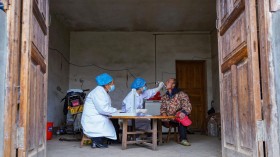The first-known European Christian church to have been built in the tropics was recently unearthed on one of the Cape Verde islands (also called the Cabo Verde islands) by archaeologists from the University of Cambridge. This find represents the oldest formal European colonial building that has been found in the sub-Saharan Africa to date.
The island, which lies 500 km off the coast of West Africa, is known to have channeled slavery for almost 300 years, according to a news release. The remains of the church of Nossa Senhora da Conceição date as early as 1470.
"It's a profound social and political story to which these new archaeological investigations are making an invaluable contribution," Marie Louise Stig Sørensen, one of the study researchers and a professor from the University of Cambridge, said in the release.
Following their excavation, researchers were able to preserve the building for public display.
"We've managed to recover the entire footprint-plan of the church, including its vestry, side-chapel and porch, and it now presents a really striking monument," Christopher Evans, Director of the Cambridge Archaeological Unit (CAU), added. (Scroll to read more...)
When digging through the church's hidden treasures, researchers came across several tombstones of local dignitaries. This finding sheds light on historical figures that are only known from textbooks, researchers added.
"From historical texts we have learned about the development of a 'Creole' society at an early date with land inherited by people of mixed race who could also hold official positions. The human remains give us the opportunity to test this representation of the first people in Cabo Verde," Evans explained.
Ten small islands consisting of harsh volcanic rock make up Cape Verde. Before the Portuguese arrived in 1456, the islands remained barren of people, mammals and trees. However, the islands were quickly transformed into iconic locations for commerce and the transatlantic slave trade. Among the tombstones, researchers also recovered fine china such as German stoneware, Chinese porcelain and West African pottery. The islands became a republic in 1975.
"Cabo Verde is a young nation in many ways, and it needs its history to be unearthed and accessed so it can continue to build its national identity," Sørensen concluded in the release.
Related Articles
Archaeology and 3D Printing: Silver Found in Jamestown Graves Helps Identify Those Buried
For more great nature science stories and general news, please visit our sister site, Headlines and Global News (HNGN).
-Follow Samantha on Twitter @Sam_Ashley13
© 2024 NatureWorldNews.com All rights reserved. Do not reproduce without permission.
![Severe Weather Threat to Impact Over 40 Million Americans Across Central US [NOAA]](https://1471793142.rsc.cdn77.org/data/thumbs/full/70189/280/157/50/40/severe-weather-threat-to-impact-over-40-million-americans-across-central-us-noaa.jpg)



